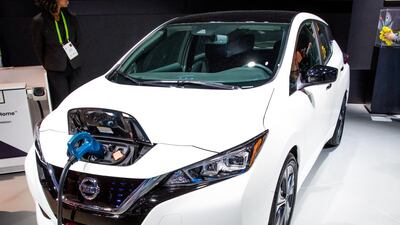As this year's Consumer Electronics Show in Las Vegas completed its second full day the debate about the future of motoring raged on, with one notable past enemy of future-facing cars stepping up to the plate.
Michigan governor Rick Snyder, who infamously went toe to toe with Tesla in a bid to stop the Californian company directly selling its cars in his state, was in conversation with a panel of industry experts, including Nissan executive vice president Daniele Schillaci, who The National spoke to ahead of the panel discussion.
Snyder, 59, aligned himself with the views of the older generation – as well as the traditional motoring heartland of Detroit, which has been somewhat slow to catch on to the potential of electric and autonomous cars.
The latter category was the chief focus of the conversation, with Snyder worried about the integration period between now and full “level 5” autonomy, stressing the need to “show the people what value the connected vehicles add” and to “send better safety information to people who don’t have autonomous vehicles”.
But he was cautiously optimistic about the changes, tempered with a note of political manoeuvring concerning future jobs, noting: “Today, how many young people can drive a stick [manual car]? We’ve almost seen this phenomenon before in terms of history.
"Some of these transitions could happen pretty quickly – ride-sharing, delivery, trucking ... but this is really about how do you deal with the society issues. We need to be proactive as a society, to say what happens to the delivery driver."
Dr Melissa Cefkin, principal researcher with Nissan, takes day to day societal concerns to another level. The cultural anthropologist's work focuses on the "social dimensions" of more autonomous vehicles on the road, in terms of how people interact with them and how the subtleties of usual driver behaviours can be applied to driverless cars. "Socially acceptable" autonomous driving, as Cefkin labels it, is going to be a significant transitionary phase between now and all cars being fully self-driving. And the controlling factors can vary from country to country: a Middle Eastern road can be vastly different to, she points out, an suburban American street.
“There will be mixed traffic for a period,” she said. “And in the future there will presumably still be motorcycles and other kind of vehicles that may or may not be autonomous - bicyclists, pedestrians. So there's many interacting parts.”
All of which may lead to new signals and adapting existing indicators on the exterior of vehicles to signal different movements. “As we add more sensors, it may be listening for sounds, like a siren,” she said. “One of the things we have to be careful of is doing things to create over-trust in the technology. It still is two tonnes of steel bearing down the road at you. There will be things that have to mature in its capabilities.”
In the more immediate future, Schillaci calls Nissan's new second-generation Leaf electric vehicle the most ambitious of the company's range, showcasing as it does the pick of their autonomous technology with its e-Pedal and ProPilot features.
Jose Munoz, Nissan's chief performance officer, agrees that the Leaf, which will be introduced to the Middle East this year, will lead their aims.
“I would say EV is going to be one part of the market that is going to be growing, but autonomous vehicles are going to be introduced as the infrastructure allows,” he says. “I believe with the global situation, with the price of oil, EVs are going to have additional interest.”
Despite the combined Africa, Middle East and India region being the only market that Nissan saw its sales shrink last year, the UAE will be a big testing ground ahead of the car maker's official link with Expo 2020.
“We'll have developed more models [by 2020],” Munoz suggested. “This technology is going to be extended throughout the world. Having the Middle East as such an important strategic position for Nissan, you can expect the region to enjoy this new technology.
“Nissan is very ahead of the game and innovative, and we believe in the future of connected, autonomous and electric cars.”
But perhaps the most ubiquitous Nissan on the UAE's roads, the Patrol, doesn't seem set to be part of that revolution.
"Will the Patrol ever be electrified? Not at this moment," Munoz said. "We see the demand coming first in smaller passenger cars, then crossovers. So far we don't see that happening in big SUVs."
When faced with the comments of another big veteran – Snyder – early on in the aforementioned CES debate, one onlooking attendee sighed and walked away muttering "these guys are doomed". Politicians may not be quite up to speed, but the motor car's medium-term future remains up for grabs, and it appears that Japan is set to lead the charge when it comes to established automakers.
_________________
Read more:
End of the internal combustion engine, part 4: an affection for classic cars lives on Britain edges towards full legalisation of self-driving cars
Can electric cars really conquer the Middle East?
_________________

